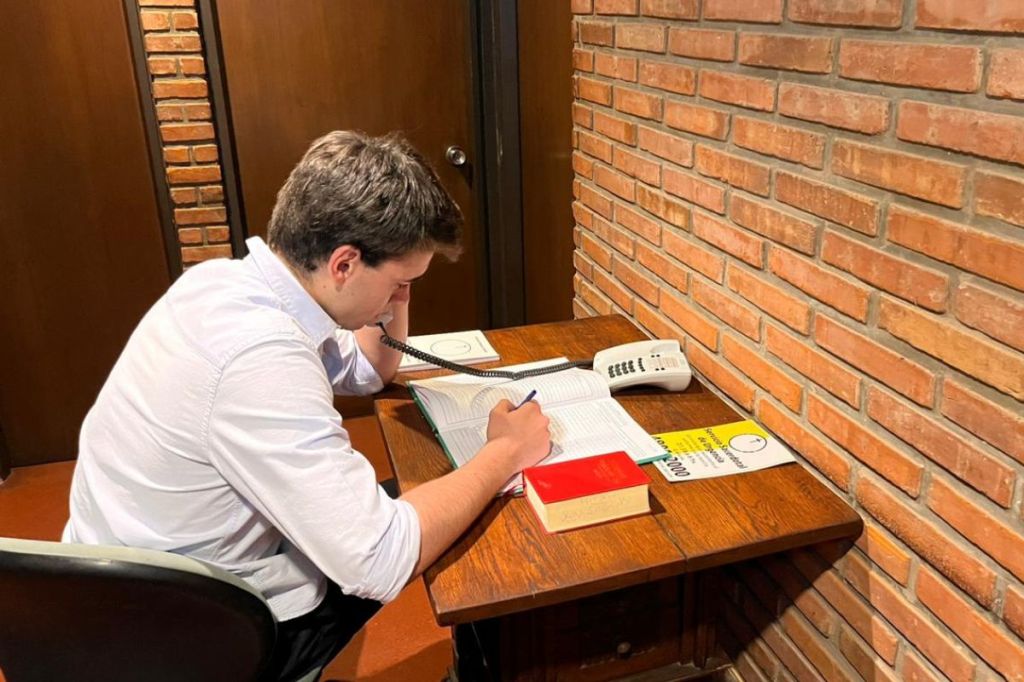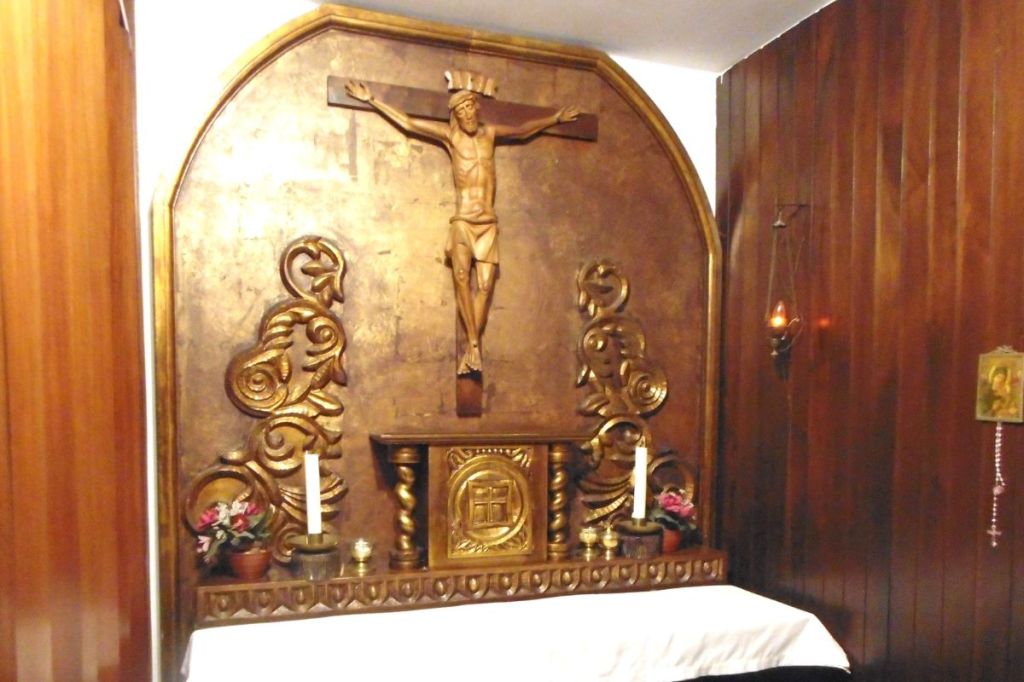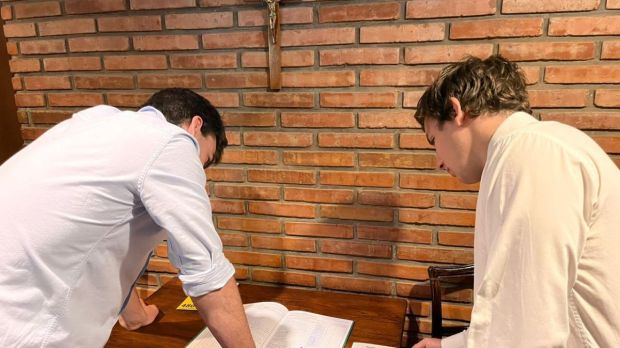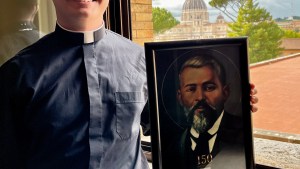The Priestly Emergency Service (Servicio Sacerdotal de Urgencia), a project present in more than 15 dioceses in Argentina, is celebrating 70 years of uninterrupted service in Buenos Aires, Argentina. It’s a monumental project with participants including both priests and laity. Throughout more than 25,000 nights it has been there for over 64 thousand sick people, their families, health care workers, and others in need of emergency spiritual assistance.
It is not just a matter of running to the side of the dying to give them anointing of the sick — a sacrament the service does, of course, provide. There are stories of endings, others of new beginnings, and even room for other unexpected sacraments.
Rewarding for both volunteers and those they visit
Martin Braceras, a layman from Buenos Aires who volunteers with the service, shared his simple and grateful testimony with Aleteia. He explained to us that there are approximately 40 priests and more than 75 lay people who share the monthly shifts so that someone is always available. Those who receive the visit, he said, experience joy and peace, but so do those who provide the service.

Fr. José María Villarino, a priest who takes turns attending to calls once a month, sees this service as the Church “that watches over the night”:
(A Church) that keeps vigil with Jesus to attend to suffering. There is a psalm that says ‘Deep calls to deep’ (Psalm 42:7). The depth of God’s mercy calls to the depth of suffering. Suffering is immersed in the mercy of God, which is the Heart of Jesus.
A service born of necessity
The Priestly Emergency Service was born in 1952 in Córdoba when a doctor couldn’t find a priest to assist his mother during the whole night. The initiative soon spread to other cities in Argentina.
The team each night is made up of two lay people and a priest. Braceras told us how it works:
Once we’re called, we take note of where the sick person is, their name, and who is accompanying them. Then, the two lay people and the priest go to the place where the sick person is. The priest attends to the sick; if they’re conscious, he talks to them in private and hears their confession if necessary. He then involves the people accompanying them and their family members, or the healthcare personnel who were there taking care of the sick person. We pray, and the priest administers the anointing of the sick or whatever sacrament is appropriate for him.
A role for the laity
The sacrament of the anointing of the sick provides God’s grace and brings tranquility, consolation, and peace to cope with the suffering and weakness of illness. However, the visit is also fundamental for the family of the sick person.
“Generally, the family members are anxious, worried, and concerned. This visit, which takes place at night, at quite lonely hours, brings a lot of comfort and consolation. We pray together, we accompany them, and they tell us their worries, their concerns, their fears,” Braceras says.
The laity receive a guide for their role, including how to respond and participate in the prayers during the sacrament of anointing.
The lay people who volunteer with the Emergency Priestly Service have been doing it for a long time. We started our apostolic activity when we were 18 or 19 years old, and we continue to do it after such a long time. Our experiences are varied and multiple, of all kinds. We’re witnesses, often silently, of various miracles of people who were distanced from the faith, distanced from their brothers and sisters, distanced from their families.
As he explains, often times sickness and physical limitations “cause us to think and meditate, helping us feel a desire to get back together with our loved ones, to find a solution or ask for forgiveness.”
Sometimes, he says, “you think that the sick person isn’t going to be prepared, but many times the sick person is also waiting to have a profound encounter with Jesus and is prepared for whatever has to come.”

Grace leads to grace
Among the many experiences he’s had, he especially remembers one of a relatively young person who was on the waiting list for a heart transplant, who called at 3:00 a.m.:
The patient made the call when he was informed that he was going to receive the transplant. He urgently requested the presence of the priest. We immediately went to visit him. There were very strict preventive measures when he was being prepared because time was pressing but the man insisted that he wanted to have a short meeting with the priest, and the priest was able to attend him while he was being prepared for the transplant.
The young man recovered from the surgery and began his own apostolate in the Emergency Priestly Service of the Diocese of Parana.
Waiting for the priest in order to die in peace
Sometimes the sick recover from their illness, even when they are gravely ill. In other cases, however, the visit precedes the patient’s departure to the Father’s house.
Braceras recalls the case of a person for whom the family couldn’t find a priest during the day. When the evening came, as soon as the Priestly Emergency Service opened at 9:30 p.m. the family called and the team went to visit.
They arrived just in time for the person to have a final encounter with Christ. The priest administered the sacraments to him and then he was able to leave in peace… The peace of mind this gives the family is quite significant. When you have a family member who is suffering and you see that they’re not at peace, the priest’s visit comforts the sick person and also gives consolation to the family at critical moments at the end of life.
Baptisms and marriages
Braceras recalls a time when they celebrated a marriage for a couple who had been together all their lives. A very old man who was ill was waiting for the priest, holding his companion’s hand. And, while the priest was talking with them, they told the priest that they’d never gotten married. They’d always postponed it for various reasons. Since there weren’t any impediments and they wanted to be married, they celebrated the sacrament of marriage right there, with the laity as witnesses.
Sometimes they also perform baptisms. Braceras mentioned cases of unexpected premature births. Bewildered relatives in such cases would call the priest requesting baptism for the child.
But baptism is also required in other circumstances. Fr. Villarino especially treasures the memory of a visit to the intensive care unit of a pediatric hospital. A mother was taking care of her 7-year-old child. Both were severely burned. The father and younger brother had just died in the fire.
It was during the COVID pandemic, so lay people weren’t allowed to accompany the priest. The health personnel were very moved, praying and crying. Fr. José María baptized the child, and also brought comfort and peace to the hospital staff. After he left, he received a call from the head of the ICU to thank him for coming under such circumstances.
An extra effort during the pandemic
Fr. Villarino remembers especially the period of the pandemic. For several months, very strict restrictions were established by the government in Argentina. There were even limitations on public worship.
Faced with this circumstance, the priests continued to visit and accompany the sick. With the help of the seminarians of the seminary of Buenos Aires, they began to provide the service starting at 11 in the morning. Fifteen more priests made themselves available to minister over the phone to the anguished and sick who were isolated.
“That was extraordinary. We priests did everything. If there were calls, we went with our car, we answered the calls, the prayer requests… There are people who are very lonely at night. They want to talk to someone, to a priest,” he adds.
The night belongs to God
Fr. José María was visibly moved while he remembered the calls that he answered to visit the sick, sometimes even on Christmas Eve: “The good thing about priestly service is that the night belongs to God. You go to tend to a sick person, and immediately you are called to attend to another sick person right at the same hospital.”
The Popes and the Priestly Emergency Service
St. John Paul II, during his visit to Cordoba in 1987, said:
I know that, as the fruit of an initiative born in this city of Cordoba, the first Priestly Emergency Service was created. Through it, every night priests and laity, in vigilant waiting, mobilize to respond to the call of Christ through his sick. I also know that this beautiful example has multiplied in various dioceses of Argentina. It gives me great joy, and I encourage you to continue in this apostolic effort through which the solicitude of the Church, who watches day and night over her neediest children, is made visible.
For his part, Pope Francis, when he lived in Argentina, was for a time part of the team of priests of the Service.



